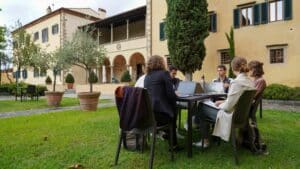This ten-week course covers the fundamentals of energy and climate policy in the EU Green Deal.
The European Green Deal is the new growth strategy for Europe to become the world’s first climate-neutral continent by 2050. As part of the Green Deal, with the European Climate Law, the EU has set itself a binding target of achieving climate neutrality by 2050. An intermediate step is the commitment to cut emissions by at least 55% by 2030. This requires revisions to the EU climate, energy and transport-related legislation under the so-called ‘Fit for 55 Package’ and the ‘Hydrogen and Decarbonised Gas Market Package’. Russia’s invasion of Ukraine has dramatically altered the landscape and prompted the adoption of the ‘REPowerEU Plan’, which updates certain Green Deal policies in order to end the EU’s dependence on Russian fossil fuels, while advancing in the fight against the climate crisis.
Targeting a broad audience of professionals and academics, this course provides an overview of the most recent developments in energy and climate policy in the EU and connects you to some of the main experts in the field.
Each week will include a combination of self-paced activities and live interaction with the other participants, FSR experts, and invited guests. These activities and interaction include reading material, videos, forum discussions, office hours to ask questions to experts, and panel debates. The course ends with group work on a mastery challenge.
This course builds on the academic knowledge and practical expertise of several schools within the EUI. In addition to FSR Energy & Climate, you will benefit from the contributions of the Florence School of Banking and Finance (FBF), the School of Transnational Governance (STG) – Climate, and FSR Water. A Each will bring in their expertise to guide you through the roadmap of the climate and energy-related parts of the EU Green Deal.
Welcome class: 9 April 2024, 12-1pm CEST
Week 1: The Big Picture (10 – 16 April 2024)
In this week, we will explore the evolution of energy and climate policy in Europe as well as the different institutions and organizations that are involved in developing and implementing it. We will also look at the solidarity and subsidiarity principles and their implications for energy and climate policy. An introduction to energy taxation will be provided as well.
Topics: European Green Deal; EU energy policy and its pillars; EU treaties, institutions and legislation; subsidiarity and solidarity; EU emergency powers; EU agencies and organisations; energy taxation; Fit for 55 Package; REPowerEU Plan.
Week 2: EU Climate Policy (17 April – 23 April 2024)
In this week, we will give an overview of the different international climate agreements and explain how climate negotiations work and how they influence the EU’s climate and energy policy. Another topic of this week is the main decarbonization instruments used in the EU, such as the EU ETS, renewable energy and energy efficiency. We will also investigate other mechanisms foreseen by the Green Deal to ensure a smooth climate transition, such as a WTO-compatible EU carbon border adjustment mechanism.
Topics: International climate agreements and EU targets; EU Emission Trading System; carbon-border adjustment mechanisms and the World Trade Organization; renewable energy policy; energy efficiency policy.
Week 3: EU Security of Supply Policy (24 April – 30 April 2024)
In this week, we will focus on the EU energy security of supply policies for oil, natural gas and electricity. We will dive into the history of network planning in the EU, and discuss the upcoming challenges related to the integration of renewable energy, with a focus on offshore renewable energy and infrastructure, including new regulated networks such as for hydrogen or CO2. We will also explain the concept of resource adequacy and the use of capacity remuneration mechanisms in Europe and their history.
Topics: Security of supply; gas imports and storage; network planning, TYNDP, TEN-E, offshore and distribution grids; resource adequacy and capacity mechanisms; new regulated networks; electro-mobility and infrastructure; solidarity; strategic autonomy; Green Deal Industrial Plan; critical raw materials; Net-Zero industry act.
Week 4: EU Energy Markets (1 May – 7 May 2024)
In this week, we will explain how the wholesale electricity and gas markets function in the EU and give an overview of the key legislation for their evolution. We will also look at the functioning of retail energy markets in the EU and the existing barriers related to unlocking demand-side participation. Finally, we will explore what a just energy transition means both in the EU and globally.
Topics: Electricity wholesale markets; gas wholesale markets; retail energy markets and new deal; just energy transition and energy poverty; price caps and other emergency interventions in energy markets.
Week 5: EU Energy Innovation (8 May – 14 May 2024)
In this week, we focus on energy innovation. This includes a deeper look onto the EU initiatives that are relevant for smart cities, including for buildings and mobility. We will explore challenges and opportunities related to different energy technologies and discuss how digitalisation is impacting the energy sector. Finally, we will provide insights on how green gases, and in particular hydrogen, will impact the energy sector and discuss the potential for their large-scale roll-out.
Topics: Smart city initiatives from buildings to mobility; Strategic Energy Technology Plan; digital transformation; smart meter; EU Digitalisation of Energy Action Plan; clean molecules; hydrogen.
Week 6: EU Sustainable Finance (15 May – 21 May 2024)
In this week, we will give an overview of the key concepts within the world of sustainable finance and highlight the core elements of the EU Sustainable Finance Action Plan, its main objectives and building blocks. The wide universe of sustainable finance instruments, standards and principles will be presented, with a particular focus on green bonds. We will reflect critically on the issue of greenwashing and discuss the objectives and key elements of the main EU regulatory initiatives that address it. Experiences with the financing of carbon removal projects will be described as well. Finally, the European initiatives will be put into a global perspective.
Topics: ESG, green bonds and sustainability-linked bonds; greenwashing; EU Taxonomy Regulation; Sustainable Finance Disclosure Regulation; Corporate Sustainability Reporting Directive; global climate finance architecture; financing of carbon offsets.
Week 7: EU Circular Economy (22 May – 28 May 2024)
In this week, we will investigate the European approach to the establishment of a more circular economy. The EU Circular Economy Action Plan and the legislative and non-legislative measures that derive form it will be introduced. A specific focus will then be given to two sectors where circularity is increasingly relevant: water and urban solid waste. Finally, we will look at methane emissions which result from human activities in the field of energy production, agriculture and waste management, and we will discuss the mitigation initiatives available.
Topics: EU Circular Economy Action Plan; water and sanitation services in the EU; urban solid waste management in Europe; methane emissions from fossil sources; methane emissions from biogenic sources; waste-to-energy; EU Methane Strategy.
Weeks 8-10: Mastery challenges
Deadline to submit the Mastery Challenge: 4 June 2024
Live session on the Mastery Challenge (1): 18 June 2024, 12-1 pm CEST
Live session on the Mastery Challenge (2): 21 June 2024, 12-1 pm CEST
On 11 December 2019, the European Commission presented the European Green Deal. In the words of Ursula von der Leyen, President of the European Commission: “This is Europe’s man on the moon moment. Our goal is to reconcile the economy – the way we produce, the way we consume – with our planet and to make it work for our people.”
The European Green Deal is an action plan of the European Commission that consists of numerous policy initiatives with the objective to make Europe the first climate-neutral continent by 2050. At the same time, it aims to boost the economy and improve people’s health and quality of life, while leaving nobody behind in the process. The proposed measures are spread over eight policy areas, including the energy and climate sectors.
In this training, we mostly focus on the Green Deal measures related to climate and energy policy, but we also provide an introduction to sustainable finance and circular economy. We aim to make it easier for a wider audience of stakeholders, professionals, and academics to enter into the ongoing processes launched by the EU Green Deal and the more recent Fit for 55 Package, and develop an understanding of the wide impact of the Green Deal on EU climate and energy policy.
This online training inherits the experience of three editions of the ‘EU Clean Energy Package’ and the ‘EU Energy Transition’ courses. For this year’s third edition of the training, we have updated the learning material according to changes resulting from the REPowerEU Plan and the ongoing negotiations on the legislative initiatives included in the Fit for 55 Package and the Hydrogen and Decarbonised Gas Market Package. In addition to the topics covered in the past edition, we also devote two weeks to two new topics: sustainable finance and circular economy.
Read the Technical Report “The EU Green Deal” (2022, edited by Leigh Hancher, Leonardo Meeus, Athir Nouicer, Valerie Reif) to dig in deeper on the fundamentals of energy and climate policy as reformulated in the EU Green Deal.
The course is given in English and developed for:
The participants can take the course on three different levels:
The amount of time required to take this course depends on the aimed course level as well as the level of expertise in the subject prior to joining the course. For example:
At the end of this course, participants will be able to:
At the end of the course, the participants can earn a Certificate of Attendance, a Certificate of Completion or a Certificate of Excellence, depending of their performance and engagement throughout the course.
Each year, the Florence School of Regulation – Energy and Climate (FSR Energy & Climate) awards scholarships for a wide variety of training courses targeting a broad audience of professionals and academics.
Applications will be assessed by a Selection Committee of FSR members on a yearly basis. The successful candidates will be informed after February 2024 and will be provided with all relevant information on how to enroll in the online course or residential training of their choice.
Send your application by 2 February 2025.
Discounts
Special offer for group enrolments: 10% discount from 5 participants from the same organisation
Contact: fsr.secretariat@eui.eu
Cancellation policy
Paid registration fee is non-refundable. However, registrant substitution may be made up to 20 days before the start date of the course.
For more information, please read the full FSR cancellation policy.
**Please kindly send your certificate of current studies with the stamp of your university to FSR secretariat (fsr.secretariat@eui.eu).
The start and end dates of your studies should also be clearly mentioned on the document. Please make sure that your period of studies fully covers the training course duration.
This ten-week course offers a dynamic blend of self-paced learning and live interactions with industry experts, providing a platform for professionals and academics to deepen their understanding and network with peers. Don't miss your chance to be at the forefront of shaping Europe's sustainable future—enroll now and become part of the green revolution!

The training will focus on three areas where cities can be particularly impactful: the uptake of renewable energy, improving the energy efficiency of Europe’s building stock, electricity metering and distribution…

Clean Molecules: Hydrogen, Biogas, Biomethane, Synthetic Gas The 2025 ‘Clean Industrial Deal’ provides a clear framework to link decarbonisation with economic resilience and competitiveness. By accelerating the deployment of clean…

Ensuring a Sustainable and Competitive Future for EU Agriculture The Vision for Agriculture and Food (EC, 2025) sets out an ambitious roadmap for the future of farming and food in…

Learn the fundamental regulatory principles of the electricity and gas sectors through hands-on, real case activities and examples with instructors from national regulatory authorities from Europe and North America, the…

Participate in the most pressing debates on the regulation of transport in the European Union through hands-on activities based on real cases and examples presented by academics, regulatory authorities and…

The Energy Law Research School seeks to offer emerging scholars (doctoral and postdoctoral researchers) in EU energy law the opportunity to gain an understanding of the most important issues in…

Crafting research with impact on energy policy and regulation LARS is a residential training addressing researchers with modeling skills who are keen to support the energy policy and regulatory debate.…

Originally designed for participants in the EUI Global Executive Master, this course is now open to all professionals seeking to deepen their understanding of energy markets and regulation. Three features…

EU Electricity Network Codes & the Clean Energy Package Enter the world of electricity markets in Europe ‘Evolution of electricity markets in Europe’ is an 9-week online course in collaboration…
To meet, discuss and learn in the channel that suits you best.